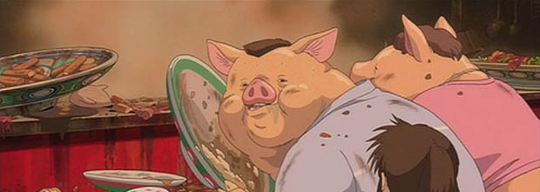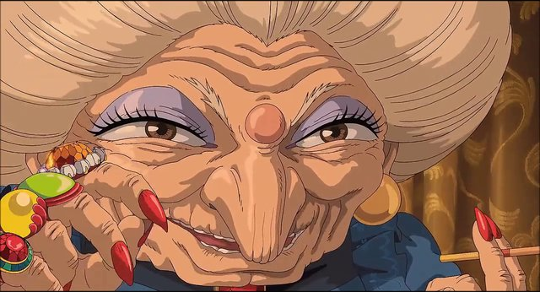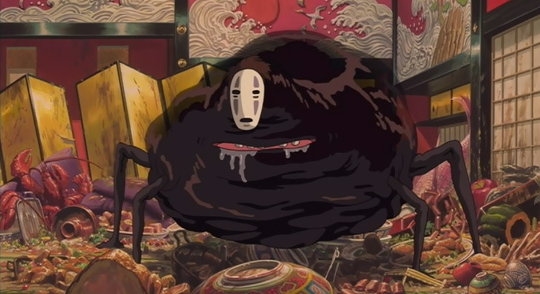Gordon Myers
Articles on Life, Truth, Love, Computers, and Music
Spirited Away
Today's blog post is going to be a movie review. This isn't a current movie by any means, either. In fact, it's 14 years old. It's also a film that I would expect many of you have already seen. But recently I felt an urge to rewatch it, and discovered a few things in the process. First, I realized that there are still many who haven't seen this film, or haven't even heard of it, and that's a shame. But more importantly, I realized some of the great lessons this film has to offer. I am talking of course about the film Spirited Away by Hayao Miyazaki.
For those not familiar, Miyazaki is a Japanese animator who makes kids' movies. And his films are kind of the gold standard in Japan. They're basically Japan's equivalent of Disney movies. In fact, if I'm not mistaken, Disney actually bought the English version rights to all of his films. Spirited Away in particular is one that I consider to be the crème de la crème of his work, and I'm not alone. It is the most successful Japanese film to date and won an Academy Award.
The story of the film is fundamentally one about a young girl overcoming her own fears and limitations in order to free her parents from the spell of an evil witch. It's also a story about friendship and love. And it's a story that draws heavily on Japanese mythology, featuring dragons, witches, talking frogs, giant babies, and everything from river to radish spirits. The artwork is spectacular, the story is unique, and the messages of the film are splendid. But as I was rewatching this film the other day for the upteenth time, one point in particular struck me as to what makes this film so incredible: there are no villains.
Right away people who have seen the film may dispute this fact. They'll remind me that the evil witch, Yubaba, is the story's central antagonist. And to that I'd say: no, she isn't really. Not really, anyway. At its core, the world of Spirited Away doesn't really have any villains. For me, that's what makes it truly so remarkable. But I need to explain and defend my position of why there really aren't any villains in this film. Please note that spoilers will follow, but this film is good enough that they won't detract at all from watching the film, so please keep reading.

I'll start by debunking the example already named: Yubaba is not a villain. What is it that makes her evil? Well, within the first 10 minutes of the film, she turns the main character's parents into giant pigs. Except... she doesn't actually do that; the parents do that to themselves. They overzealously decide to help themselves to plates full of food left out at what appears to be an abandoned theme park, but is in fact actually an enchanted spirit village. Yubaba isn't present or even aware of the humans at that point; the food is simply not meant for humans with the unfortunate side effects is that it automatically turns non-spirit diners into pigs. Yubaba didn't take any action at all here; it was the parents' own greed that resulted in the curse.
But Yubaba does decide to keep the parents as pigs so that she can raise them for slaughter. And this is the central plot point which the main character, Chihiro, is working to prevent. Yes, this seems evil, but I'm hesitant to really label it as being downright evil, and instead call it a callous business practice, not unlike many of the seemingly callous business practices that we see in the real world. It's not a malovelent, calculated plan; it's simply a matter of convenience. In the eyes of Yubaba, human beings are an entirely different species. They are like animals to her. And what meat company wouldn't freely take advantage of unclaimed livestock that wandered onto their premises? It's not always pleasant to talk about it, but it doesn't make her a fundamentally evil person.
So rather than examining Yubaba's inactions, let's look at her actions. Within the first 30 minutes of the movie, she hires Chihiro to work at the bath house. Chihiro asks her for a job, and she agrees to give her one. In fact, Yubaba has sworn an oath that if anyone, regardless of skill, circumstance, or ability, asks her for a job, she will always grant their request. And not merely on a probationary or provisional basis either; she offers permanent employment to anyone who asks. Does that sound evil to you? You'd be seriously hard-pressed to find that same kind of generosity from even some the best companies!
During Chihiro's employment, at several points, Yubaba compliments Chihiro when she does her job well. Moreover, Yubaba offers a path for Chihiro to follow that will ensure the safe release of her parents. And she keeps her promise. Again, what's evil about any of that? By the end of the film, Chihiro embraces her employer with a hug of gratitude, sending home the message that there aren't villains.

Another character to consider is a spirit called "No Face." Initially a meek, speechless spirit that is denied entrance to the bath house in which all the other spirits partake, this character takes notice of Chihiro and follows her in through a back door. It's shown just how lonely this character is, and how it will do anything to appease others and win their praise and affection. Ultimately it's revealed that this character's people-pleasing tactics are fundementally selfish, as it only acts out the behaviors it thinks others are desiring in order to fill a void. And when it still doesn't feel satisfied, it starts eating the other characters alive, which in turn triggers an increasingly insatiable hunger.
In short, No Face is a character that represents loneliness and lust. It starts out innocent, but due to its hunger for affection, it grows into a disgusting monster that consumes everything and everyone in its path. It does so by preying on the weaknesses of others, but only through illusion and manipulation. In fact, at the zenith of its lust, there is a scene where Chihiro confronts No Face and it is revealed just how desperate the creature is for Chihiro's validation. After having assaulted and consumed half the staff at the bath house, he nearly does the same to Chihiro. That's pretty evil, right?
But let's examine Chihiro's response to this situation: she sits patiently, quietly in front of him, completely unafraid of his condition. She has absolutely no fear. While every other character on screen is either frantically running away or trying to lock the doors, she enters the same room and calmly sits down beside him to chat. When he charges at her signaling he might try to eat her, her first instinct is to help him. She says, "before you eat me, eat this," and then hands him some magical medicine. The pill then triggers a violent reaction in which everything bad in his system is flushed out.
During this reaction, she runs away from him, which makes for a great chase scene. But as soon as that is over, No Face returns to his original form, and starts to follow Chihiro once more. At this point, she stops running away and invites him to sit next to her on the train as a friend. One of the supporting characters is initially shocked that she would let him anywhere near her, but Chihiro responds simply by saying, "I think the bath house makes him crazy. He needed to get out of there."

This, to me, is actually the most telling line of the whole film. This confirms why the message is so powerful, that there are no villains. Even after having been nearly assaulted by this character, she calmly recognizes that it is not the character, but the circumstance, that was the real problem. Chihiro not only helps him out of the unfortunate circumstance, but immediately befriends him and helps draw the best out of him, later helping him to get a job as a personal attendant of another character.
There are more examples, too. Zeniba could be seen as villanious, at least temporarily, for having nearly killed one of the other characters, Haku. But she quickly becomes a fast friend and supporter of both Chihiro and Haku. The giant baby could be seen as villanious, but after being forced out of his spoiled environment, he becomes an ardent defender of Chihiro as well. Even many of the spirit workers could be seen as evil, or at least as dangerous, for their xenophobia of humans, especially at the beginning of the film. But that too is overcome as they work beside Chihiro and begin to appreciate her.
The only villains in Spirited Away are intangible. Qualities like greed, lust, hatred, fear, envy, and theft are the villains of the film. These qualities are acted out, for a time, by various characters. Even Chihiro herself shows a lot of fear at the start of the film. But all of these qualities are overcome, either through the characters' individual growth, or through the help and support of friends. This is a truly powerful message. There are no evil characters; everyone can be redeemed.
Contrast this with even some of the most treasured Disney films. In Lion King there are clearly good characters and bad characters. There is no redemption for Scar. At the end of the film, he is eaten alive by his own hyenas. In Aladdin, there is no hope for Jafar. He is forever banished to a tiny prison. This is actually a pretty common message with most Western Disney movies: there are good people, and bad people, and the bad people should either be killed or exiled.
In Spirited Away, there are just people. (Well, sort of. If you count frogs and radishes as people.) These people sometimes act out bad qualities, and sometimes it can seem pretty scary, but even this can be redeemed by not giving into fear and persistently loving and supporting them. In the world of Spirited Away, gratitude is given even to those who were once seen as enemies. There are no villains. I think we can learn a lot from messages like these. And it sure would do some good to have more movies like that.
36 Comments from the Community:
Open this site Fortune Tiger
This comment is awaiting moderation.
Eu recomendo este jogo Fortune Tiger
This comment is awaiting moderation.
Participe e ganhe no site original Fortune Tiger
This comment is awaiting moderation.
Acesse o site real do jogo Fortune Tiger
This comment is awaiting moderation.
Um dos melhores jogos para ganhar Fortune Tiger
This comment is awaiting moderation.
Ofereco a voce o melhor jogo Fortune Tiger
This comment is awaiting moderation.
O melhor e mais popular jogo Fortune Tiger
This comment is awaiting moderation.
Recomendo o popular jogo a todos Fortune Tiger
This comment is awaiting moderation.
Eu recomendo esse jogo a todos fortune Tiger
This comment is awaiting moderation.
Va e ganhe com o jogo fortune Tiger
This comment is awaiting moderation.
Ganhe dinheiro de verdade jogando o jogo Fortune Tiger
This comment is awaiting moderation.
Grandes vitorias podem ser encontradas no jogo Fortune Tiger
This comment is awaiting moderation.
Ganhos faceis no jogo poplar Fortune Tiger
This comment is awaiting moderation.
Ir para o site principal blaze
This comment is awaiting moderation.
Melhor site para cassinos blaze
This comment is awaiting moderation.
A melhor casa de apostas para apostar 1win
This comment is awaiting moderation.
https://eroticahd.ru/
This comment is awaiting moderation.
https://www.pragmatismopolitico.com.br/2024/03/revelando-poder-proxies-datacenter-guia-completo.html
This comment is awaiting moderation.
supermoney88
This comment is awaiting moderation.
sunmory33
sunmory33
This comment is awaiting moderation.
mantul88
mantul88
This comment is awaiting moderation.
rgbet
This comment is awaiting moderation.
rgbet
This comment is awaiting moderation.
This comment is awaiting moderation.
chemical development
This comment is awaiting moderation.
Learn about sensory strategies for people with autism, covering how they perceive the world and manage sensory overload.
https://thespectrum.org.au/autism-strategy/autism-strategy-sensory/
Discover more about sensory sensitivities here:
https://thespectrum.org.au/autism-strategy/autism-strategy-sensory/
This resource is valuable for professionals and families dealing with autism.
This comment is awaiting moderation.
I recommend this trust site anyswap
This comment is awaiting moderation.
Seamlessly transfer your digital assets across multiple blockchain networks with the advanced functionality of the anyswap cross-bridge
This comment is awaiting moderation.
Discover the powerful capabilities of youtube api v3 for integrating YouTube data into your website or app seamlessly. Whether you're building a custom video player or managing playlists, the YouTube API v3 documentation offers a comprehensive guide to get started.
This comment is awaiting moderation.
To access YouTube's data services, you'll need to generate a YouTube API key. This essential key allows your application to communicate with YouTube's servers, enabling you to fetch video data, manage playlists, and more.
This comment is awaiting moderation.
It's best and original bentley villas dubai
This comment is awaiting moderation.
https://nmashpenza.ru/
This comment is awaiting moderation.
travel visa pro
This comment is awaiting moderation.
situs Kantorbola
Dalam dunia taruhan online, memilih situs yang tepat adalah langkah pertama untuk meraih pengalaman bermain yang memuaskan dan aman. Salah satu situs yang sering menjadi pilihan banyak pemain adalah Kantorbola, sebuah platform judi online yang dikenal dengan reputasinya sebagai situs slot terpercaya. Artikel ini akan membahas lebih dalam tentang kantorbola dan mengapa situs ini layak menjadi pilihan utama para pecinta slot.
This comment is awaiting moderation.
https://shvejnye.ru/
This comment is awaiting moderation.
https://receptmult.ru/
This comment is awaiting moderation.